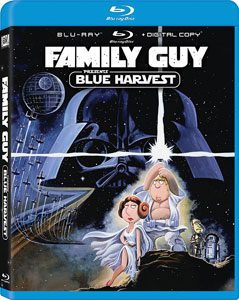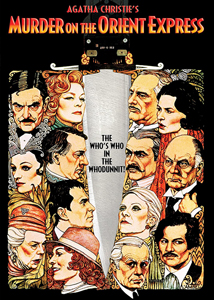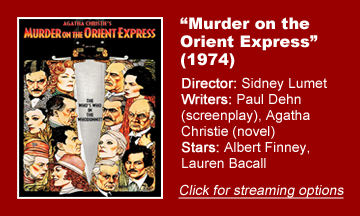Albert Finney looks the part of Hercule Poirot in his only turn as the Belgian detective extraordinaire in the 1974 adaptation of Agatha Christie’s “Murder on the Orient Express.” But he also runs through the hallway of the titular train at one point, anxious to pursue the next step in his investigation; running seems so undignified for the great sleuth.
It’s one of several things that are just a little bit off in this mostly faithful adaptation from director Sidney Lumet and writer Paul Dehn (“Beneath the Planet of the Apes”).
Old-fashioned style
Lumet — who also helmed one of my favorite David Mamet-penned films, “The Verdict” – directs “Orient” in an old-fashioned style, which is appropriate since it’s set in 1930 on a train crossing Eastern Europe. It’s not black and white, but it has a washed-out look, and the performances are all very actorly.
Dehn, via Christie, keeps the dozen or so characters distinct. If it’s hard to keep track of them all, it’s because there are so many of them.
Highlights include:
- Wendy Miller as elderly German Princess Dragomiroff, who doesn’t smile because her doctor has advised against it;
- Sean Connery as a proud overseas British colonel and Vanessa Redgrave as his doting new girlfriend;
- Jacqueline Bisset as a pretty young countess who is hard to read;
- and “Psycho’s” Anthony Perkins, whom we automatically look on with suspicion, especially since McQueen stutters and seems to have mother issues.
Richard Widmark plays a very killable Ratchett.
Punched-up comedy
Christie has smile-worthy moments in her forward-plunging narratives, but Dehn punches up the comedy and adds his own lines sometimes. “Is it about sex?” a Chicago man inquires of the book being read by his stuffy British bunkmate. “No, it’s about 10:30,” is the droll reply.
And after every interview session Poirot conducts with a passenger/suspect, train official Bianchi (Martin Balsam) and the doctor (George Coulouris) excitedly announce that person must be the murderer.
Lumet uses a lot of close-ups, often focusing entirely on the interview subject, allowing us to examine him or her the way the off-screen Poirot is.
“Orient” thinks the audience needs hand-holding sometimes, inserting flashback shots to earlier events. As noted, there are a lot of characters to keep track of, so I won’t deny that those flashbacks can be helpful.
But I would rather Poirot be more deliberate and detailed in his explanations, rather than so hyper; Finney barely keeps the accent from running away from him as he unveils his theory to the assembled passengers. The hyperactivity is only enhanced by the quick intercuts, which I suspect the studio mandated late in the game.
“Orient” is a high-class production, but Christie’s plot remains the high point. Still, there is something about the cinematic medium that makes me think about some aspects of the story more. This is a good mystery throughout – with fun clues like the “H”-embossed handkerchief — but it’s a rare case where the solution might be more fascinating than the questions.

The final act (Spoilers)
(SPOILERS FOLLOW.)
Predating the movie “Clue,” everyone commits the murder. Well, not really, but everyone is on the train to get in a postmortem stab wound on Ratchett, who is dead by McQueen’s poison, with room-access assistance from Lauren Bacall’s Mrs. Hubbard. Everyone signs off on the poisoning.
It’s rare that the mutual suspicions that add richness to this genre turn out to be not present at all. It gives a viewer something new to look for on a repeat viewing, as we realize a lot of behavior details are faked or take on a different meaning.
Another fascinating oddity of the conclusion is that Poirot allows everyone to get away with it. This goes against the ethics of most investigators – including Poirot himself, one would assume – who take it as a given that they will turn their findings over to law enforcement.
To his credit, Poirot goes off to ponder the morality of his decision. And as a viewer, I’m certainly not disappointed in Poirot; it’s well-established that Ratchett gets what’s coming to him, and maybe there’s even a civility to the idea of a dozen people getting together to execute justice.
For all the (sometimes too-extreme) comedy beforehand, “Murder on the Orient Express” ends up being a surprising think-piece by the time the credits roll.
Every week, Sleuthing Sunday reviews an Agatha Christie book or adaptation. Click here to visit our Agatha Christie Zone.


